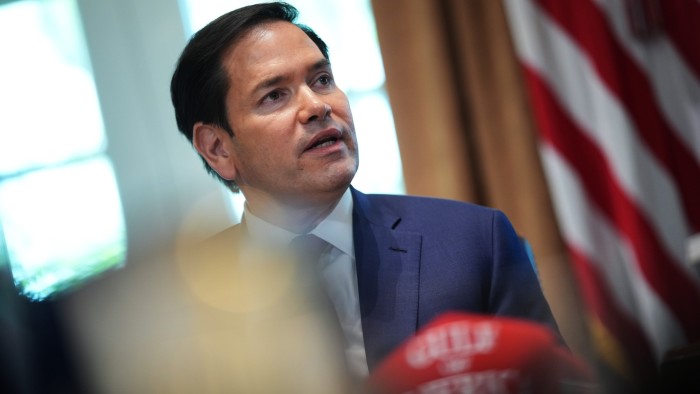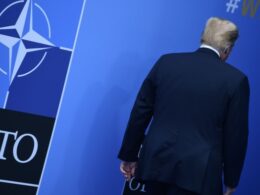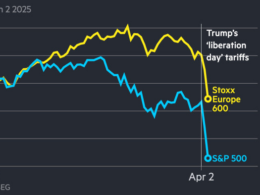Unlock the White House Watch newsletter for free
Your guide to what Trump’s second term means for Washington, business and the world
US secretary of state Marco Rubio urged India and Pakistan to “de-escalate tensions” after a deadly attack in Indian-administered Kashmir last week, highlighting Washington’s growing alarm about the frictions between the nuclear-armed neighbours.
Rubio’s appeal came in separate phone conversations with senior officials in India and Pakistan on Wednesday as the rising tension in South Asia threatens to reignite one of the region’s longest-running conflicts after New Delhi linked the killing of 26 civilians to Islamabad.
Speaking to Pakistan’s Prime Minister Shehbaz Sharif, Rubio urged Pakistani officials to co-operate in “investigating this unconscionable attack”, the state department said. “Rubio also encouraged Pakistan to work with India to de-escalate tensions, re-establish direct communications, and maintain peace and security in South Asia,” it added.
Rubio delivered a similar message to Indian foreign minister Subrahmanyam Jaishankar, saying he “expressed his sorrow” over the attack on tourists in Pahalgam and committed to “co-operation with India against terrorism”. He similarly encouraged New Delhi to collaborate with Islamabad, the state department said.
Rubio’s peacemaking push comes a day after Indian Prime Minister Narendra Modi said the army had “operational freedom” to respond to the attack. The Pakistani government claimed early on Wednesday that “credible intelligence” showed that its neighbour intended to militarily strike by Thursday.
Islamabad has denied any connection to the Pahalgam attack, called for a neutral investigation and suggested the massacre was a “false flag operation”. It also accused New Delhi of engineering terrorism in Pakistan’s restive provinces bordering Afghanistan.
The two sides have downgraded ties since the attack. Pakistan is already fighting a surge in violence it blames on militants allied with Afghanistan’s Taliban, which is seeking closer ties to India.
“The international community must remain alive to the reality that the onus of an escalatory spiral and its ensuing consequences shall squarely lie with India,” Attaullah Tarar, Pakistan’s information minister, said in an English-language broadcast shortly after midnight.
The foreign ministers of China, Iran, the United Arab Emirates and Saudi Arabia have also been attempting to ease tensions.
India has accused Pakistani forces of firing across the de facto border along Kashmir, called the Line of Control, for several consecutive days. Pakistan’s Armed Forces declined to comment on the allegation.
A foreign diplomat in South Asia said neither side wanted there to be an escalation, but “the concern is around miscalculation”. They added that India was pursuing other avenues before an armed strike, including opposing a $1.3bn IMF loan to Pakistan due to be discussed next week.
Indian officials did not reply to requests for comment. Pakistan’s dollar bonds and stocks are set for their worst month since 2023, when the country teetered on the brink of default.
“Going public with warning of an impending attack might cause India to delay a strike while also giving Pakistan time to encourage international pressure on India to refrain from a strike,” said Christopher Clary, a professor of political science at the University at Albany in New York.
But he cautioned that India was too big and powerful for other nations to impose meaningful costs on New Delhi if it chooses to go forward with a strike. “Public statements and private expressions of concern may be all that Pakistan gets,” Clary added.
Source link









